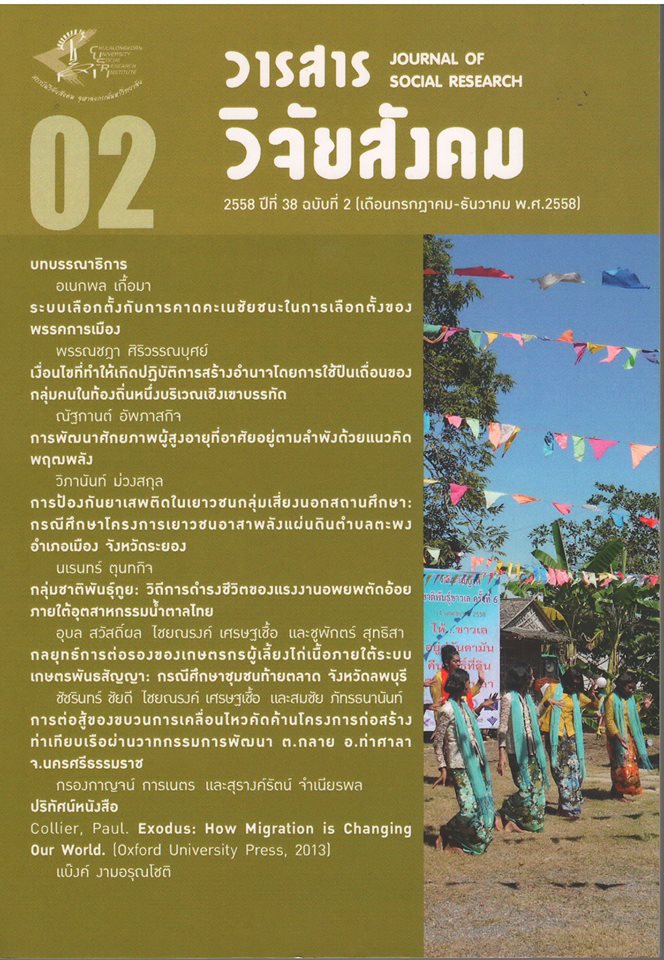การต่อสู้ของขบวนการเคลื่อนไหวคัดค้านโครงการก่อสร้างท่าเทียบเรือผ่านวาทกรรมการพัฒนา ต.กลาย อ.ท่าศาลา จ.นครศรีธรรมราช
Main Article Content
บทคัดย่อ
บทความชิ้นนี้ มีวัตถุประสงค์เพื่อทำความเข้าใจการต่อสู้ทางวาทกรรมเรื่องการพัฒนาของขบวนการเคลื่อนไหวคัดค้านโครงการก่อสร้างท่าเทียบเรือ ตำบลกลาย อำเภอท่าศาลา จังหวัดนครศรีธรรมราช การวิเคราะห์ให้ความสำคัญกับการวิเคราะห์วาทกรรม และปฏิบัติการทางวาทกรรมที่ขบวนการเลือกใช้ในการต่อสู้ต่อรองในสนามวาทกรรมทั้งในระดับพื้นที่และระดับชาติ นอกจากการต่อสู้ผ่านโครงสร้างปกติแล้ว ขบวนการได้สร้างวาทกรรมและปฏิบัติการทางวาทกรรมลดทอนความชอบธรรมของโครงการ เริ่มต้นจากวาทกรรมว่าด้วยผลกระทบและการดำเนินงานที่ขาดหลักธรรมาภิบาล จากรายงานการวิเคราะห์ผลกระทบสิ่งแวดล้อม สร้างวาทกรรมทะเลร้างขึ้นเพื่อเป้าหมายในการต่อสู้ ต่อมาวาทกรรมอ่าวทองคำก็ถูกสร้างขึ้นเพื่อเป็นคู่ตรงข้าม และวาทกรรมการปกป้องพื้นที่ผลิตอาหารได้ถูกเสนอในฐานะทางเลือกการพัฒนาพื้นที่ขบวนการ ในที่สุดแล้ว บริษัทเจ้าของโครงการได้ตัดสินใจยุติโครงการ ซึ่งจากการวิเคราะห์วาทกรรมก็แสดงให้เห็นว่าการต่อสู้ทางวาทกรรมของขบวนการนำไปสู่การระดมทรัพยากร พันธมิตรและความชอบธรรมของขบวนการได้มากขึ้น
The Contestation of Development Discourses of the Anti-Port Project Movement in Tha Sa La, Nakhon Si Thammarat Province
The paper aims to understand the contestation of development discourse of the anti-port project movement in Tha Sa La, Nakhon Si Thammarat. It focuses on discourse and discursive practice of the movement both in local and national fields. Apart from struggling via existing structural mechanism likes Ministry of Natural Resources and Environment, National Human Right Commission of Thailand, new structural opportunity likes Community-Health Impact Assessment, the movement also constructed the discourses and discursive practices to delegitimize the project. Started from the side-effect of the project and bad governance of the project owner, based on the environmental impact assessment report, the discourse of ‘empty sea’ was constructed and served as the target. After the Community-Health Impact Assessment finished, the discourse of ‘golden bay’ was constructed as a binary. Lastly, the discourse of ‘protecting food production area’ was presented as alternative development for the movement. Finally, the project was cancelled by the owner, although there was no strong evidence to prove the victory of the movement, the discourse analysis indicated that the contesting discourse of the movement led to mobilize more resources, alliances and legitimacy of the movement.
Article Details
1) บทความนี้เป็นลิขสิทธิ์ของสถาบันวิจัยสังคม จุฬาลงกรณ์มหาวิทยาลัย แต่ความคิดเห็นและเนื้อหาเป็นของผู้แต่ง
2) ทัศนะและความคิดเห็นที่ปรากฏในบทความในวารสารวิจัยสังคมและปริทัศน์ สถาบันวิจัยสังคม จุฬาลงกรณ์มหาวิทยาลัย ถือเป็นความรับผิดชอบของผู้แต่งบทความนั้น และไม่ถือเป็นทัศนะและความรับผิดชอบของกองบรรณาธิการวารสารวิจัยสังคมและปริทัศน์ สถาบันวิจัยสังคม จุฬาลงกรณ์มหาวิทยาลัย กองบรรณาธิการไม่สงวนสิทธิ์ในการคัดลอก แต่ให้ระบุถึงการอ้างอิง


